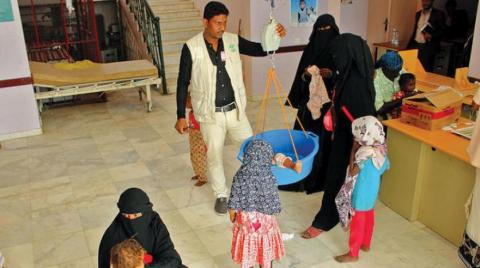Saudi Arabia, UAE urge better humanitarian aid access to Yemen


Saudi Arabia and the United Arab Emirates (UAE) jointly held a workshop titled "Access to Yemen Initiative" in the Saudi Arabian capital of Riyadh last week.
The workshop addressed the constrained access of humanitarian aid in Yemen and possible solutions.
Among the participants were Abdullah Al Rabeeah, supervisor general of Saudi Arabia's King Salman Humanitarian Aid and Relief Centre (KSrelief), and UAE Assistant Minister of Foreign Affairs and International Cooperation for International Development Affairs Sultan Al Shamsi, and U.N. Office for the Coordination of Humanitarian Affairs (OCHA) representative Rene Nijenhuis, as well as other U.N. agencies and international organizations.
Rabeeah pointed out violations and abuses against the people of Yemen by the Houthi rebels.
He argued Houthi militias have not hesitated and continue to commit various violations that contradict humanitarian and international laws, in order to achieve their own aims to remain in power and exploit their own people to strengthen their military capabilities.
Rabeeah then discussed ways for access for humanitarian aid, such as implementing the full use of Yemeni and Saudi ports.
"The initiative calls to denounce the continued violations and calls upon the international community to unite in condemning these actions against humanitarian action to help the Yemeni people," he said. "We have to commend the decentralization initiated by the U.N. organizations in Yemen."
Al Shamsi shared occasions of Houthi violations that he has been tracking. There were more than 6,000 occasions even after the Stockholm agreement and they remain ceaseless, according to him.
Nijenhuis extended thanks and appreciation on behalf of the humanitarian community to both the KSA and UAE for their generosity in helping to lessen the suffering of the Yemeni people.
He stressed Saudi Arabia and the UAE are working together to help reduce the suffering of the Yemeni people as much as possible.
He referred to the workshop as "fruitful" and shared thoughts on establishment of neutral mechanisms for monitoring and evaluation in order to follow up humanitarian action and ensure the delivery of aid to the allocated beneficiaries.

Paris — The French humanitarian organization Acted announced that it has delivered cash assistance to nearly 89,000 people affected by displa…

Sana’a — Fuel and food imports into ports under the control of Yemen’s Houthi movement on the Red Sea have continued to fall for…

ADEN — Yemen Airways, the country’s national carrier, announced it will resume flights between Aden and Abu Dhabi beginning in January…